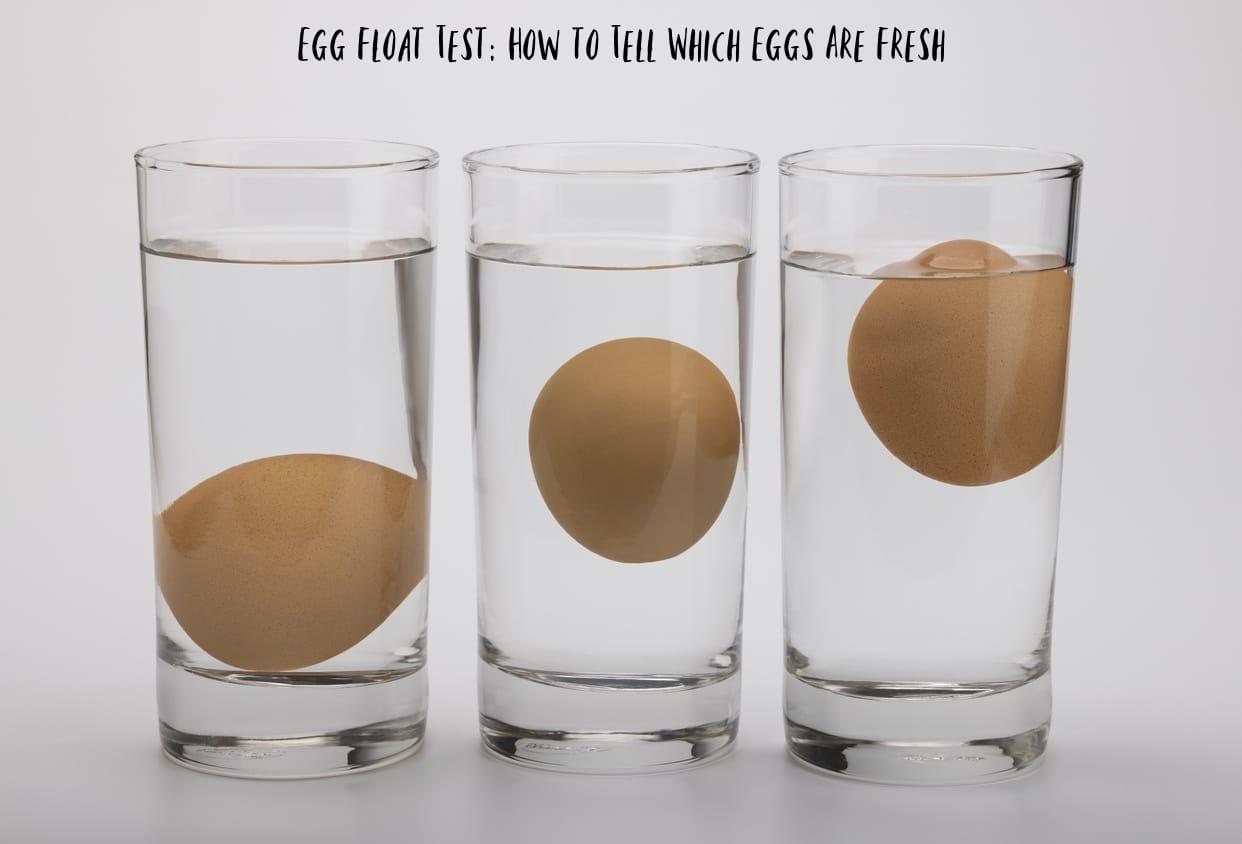The egg float test has been around for as long as most people can remember. It’s a tried and true method of testing if eggs are fresh or not, but is it as effective as we think? Let’s find out by analyzing how this test works.
[toc]
What is the Egg Float Test?
Many people use the egg float test as a way to tell if an egg is good or bad. The results show you about how old an egg is, and it only takes about five to ten minutes to complete a carton of eggs.
You can use this method whether your hens freshly laid the eggs or if you bought the eggs from the grocery store.
How to Conduct an Egg Float Test
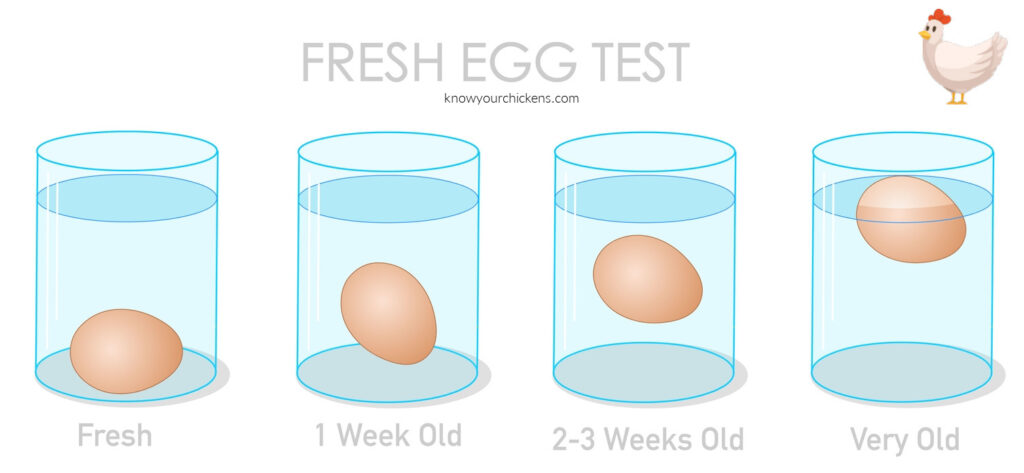
To conduct this bad egg test, you will need a bowl or cup that’s big enough to fit an egg in. Fill the container with at least two inches of water. Cold water works best.
Before you start, check all your eggs for cracks since that could affect the results. Then, place one egg in the water at a time and watch what happens.
Here are the possible results:
- Egg stays at the bottom on its side – very fresh
- Egg stays at the bottom on its side but one end is slightly raised – still fresh
- Egg touching bottom but sitting upright – moderately fresh and safe to eat
- Egg floats toward the top – very old or rotten and not safe to eat
Based on how the egg floats or sinks, you’ll be able to tell if an egg is safe to eat or not. The most important thing to remembers is that bad eggs float.
Is the Egg Float Test Accurate?
Despite being an old and simple method, this bad eggs test is not a myth. It’s still one of the most accurate egg testing methods to this day. If the egg floats, it’s bad and should not be eaten.
Those who are very familiar with conducting this test might even be able to tell exactly how old each egg is. However, despite some claims, it’s not possible to know the sex of a fertilized egg by floating it in water.
Other Ways to Tell if an Egg is Fresh
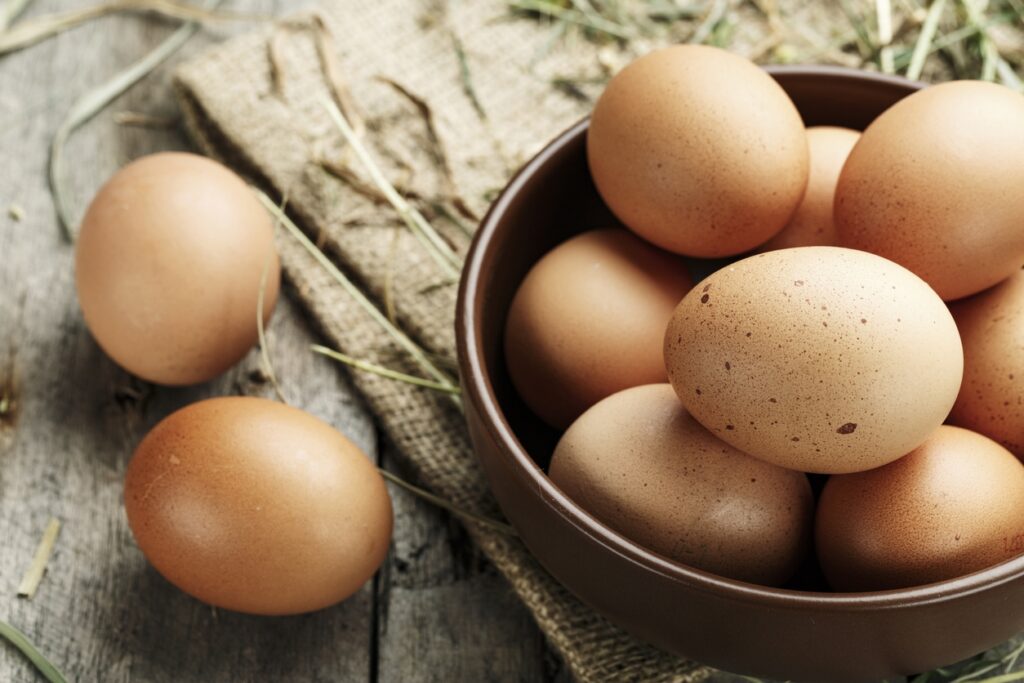
The egg water test isn’t the only way to find out if your eggs are safe to eat. There are at least five other methods that work well.
Some people believe that shaking an egg is a good way to tell if an egg is bad, but it’s not as effective as the other options. So, you should steer clear of that method if possible.
Try Candling
Candling isn’t an easy method, but it’s effective. You’ll need to shine a bright light on the egg while in a dark room. In the past, people used candles for this, but there are many safer alternatives today. A flashlight is usually the best option.
To do this method, hold the large end of the egg up to the light. Quickly turn the egg from left to right, and the contents inside should illuminate.
This method will show you how big the air cells in the egg are. The freshest eggs will have an air cell that’s thinner than 1/8 inch. The air pockets will get larger as the egg ages due to gasses replacing the water lost during evaporation.
Candling usually requires some practice before you can make accurate assumptions about an egg’s age.
Conduct a Sniff Test
As you can imagine, eggs that are old or rotten will have a much fouler smell than fresh eggs. Whether they’re raw or cooked, bad eggs will give off an unmistakable stench.
If you can’t tell just be holding the egg, try cracking it. You’ll certainly be able to smell cracked rotten eggs. If the egg has no unusual odors, it’s safe to eat.
Whenever something smells odd about an egg, it’s best to toss it. Then, thoroughly wash any surfaces that the egg touched.
Perform a Plate Test
The plate test is another method that involves cracking the egg. Crack the egg onto a plate and watch how it rests on the surface.
A very fresh egg will have a firm white part and a vibrant yolk that sits upright. Older eggs will have flat yolks that will quickly spread across the plate.
A yolk that spreads doesn’t guarantee that it’s a bad egg, but it means that it’s not super fresh. An egg that’s not safe to eat will have a foul smell in addition to the runny yolk.
Inspect the Egg Visually
You can tell a lot about an egg just by examining its features. Certain aspects of the egg can confirm that it’s no longer fresh.
Check to make sure the shell of the egg isn’t slimy or powdery. Cracks are also a cause for concern because bacteria could get inside the egg. If the shell feels or looks unusual, it could also be a sign of mold.
When you crack the egg, make sure there’s no discoloration inside. If there’s any pink, blue, green, or black in the yolk or white part, that’s a sign of bacteria forming.
If anything looks or smells out of the ordinary, throw out the egg and wash any surfaces it came into contact with. Eggs that have no causes for concern are safe to eat.
Check the Carton Date
If you bought your eggs from the store, the easiest method is to check the expiration date on the egg carton. Depending on where you live, this date will be marked as “sell by” or “expiration date.”
Eggs that are past the sell by date aren’t immediately bad. Once eggs are packaged, they must be sold within 30 days, but they could still be fresh to eat for a while longer. However, eggs past an expiration date will not be fresh.
Eggs within the sell by or expiration date are fresh, but be wary of ones that have passed those dates. If you’re unsure whether or not the eggs are still safe to eat, you may need to conduct one of the above tests.
How Long Do Eggs Last For?
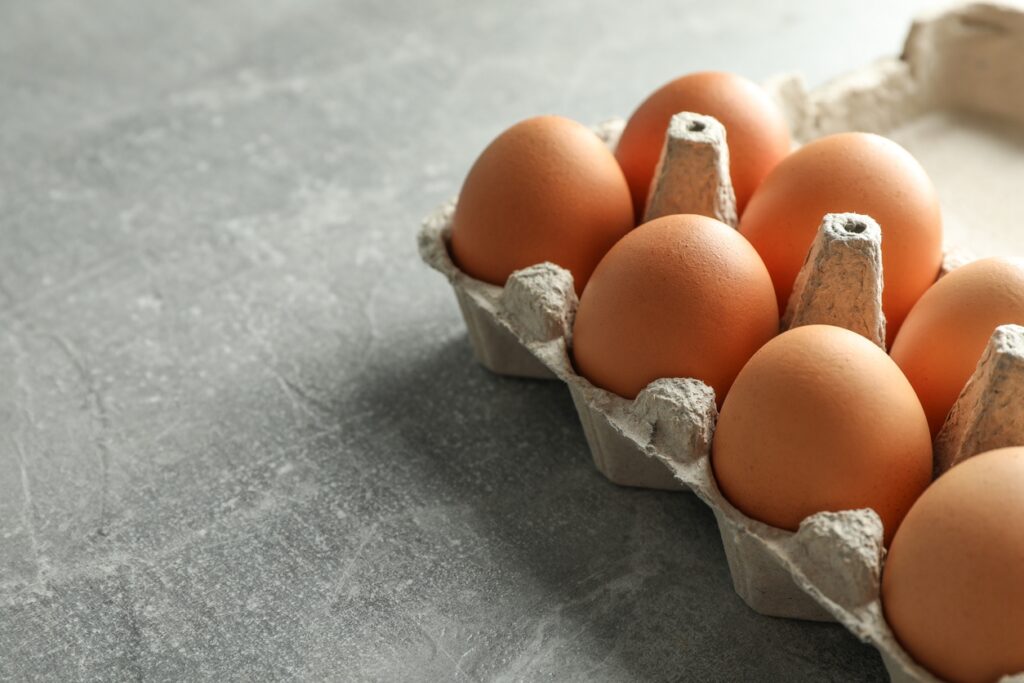
How long eggs last may vary, but in general, store-bought eggs last for about five weeks if kept in the refrigerator.
If refrigerated at the correct temperature, eggs can be used eight weeks after they’ve been laid, but some fresh eggs can even last up to three months.
Store-bought eggs and fresh eggs are drastically different because they’re at different stages. Eggs you buy at the store are usually about a month old since they need time to be packed and transported.
To ensure that your eggs last as long as possible, you’ll need to make sure they’re stored properly. Otherwise, they could go bad before their expiration date. Just remember that the longer you wait to eat your eggs, the less fresh they’ll be.
How to Store Eggs
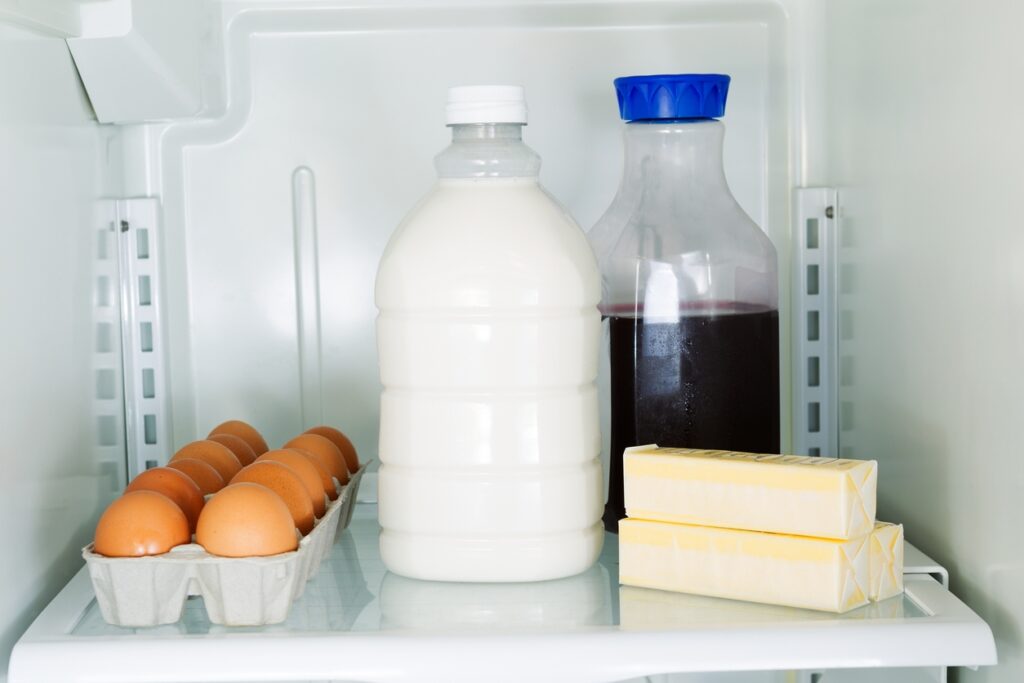
There are several ways to store eggs, but some are much more efficient than others. Where you store your eggs is crucial to keeping them safe and fresh.
Here’s an overview of how long eggs last with each storing method:
| Storing Method | How Long will They Last? |
| Refrigerating | About 5 weeks |
| Freezing | Up to a year |
| Dehydrating | Several years |
| Pickling | 3 to 4 months |
| Oiling | Up to a year |
| Salt Curing | 3 to 4 weeks |
| Water Glassing | Up to a year |
Most Effective Egg Storing Method
All eggs should be kept in the refrigerator. Keep them as far back as possible since that’s where the temperature is the most stable. Despite common belief, you should not keep them in the fridge door.
If you don’t have access to a refrigerator for your eggs, find a cool and dry place to store them, such as in a cellar or pantry. However, eggs that aren’t kept cold enough won’t last as long.
Storing eggs at room temperature can be risky because it increases the risk of salmonella. Salmonella spreads quickly at room temperature and could infect your whole family. In extreme cases, salmonella can lead to sickness and death for humans and animals.
If your eggs look or smell unusual, throw them out and clean anything they touched. It’s better to be safe than sorry in that scenario.
While setting eggs in the fridge is the easiest and most efficient way to store them, there are a few other methods that could work too.
Freezing
If you crack your eggs into an ice cube tray or similar container, you can freeze them to make them last even longer. Frozen eggs can sometimes last up to a year. It’s also an easy way to preserve the yolks and egg whites separately if needed.
Dehydrating
If you dehydrate your eggs, you can store them in an airtight container for several years. You can dehydrate them in a food dehydrator or in an oven at a low heat for a long period of time.
Pickling
If you like pickled eggs, it’s another great storing method. You’ll need to hard boil your eggs, peel them, and then put the hard boiled eggs in a mason jar with your vinegar mix. You can add in items like onions, beets, and spices.
Before you eat them, let them refrigerate for one week. Pickled eggs usually last for three to four months. Hard boiled eggs that aren’t pickled only last for about a week.
Oiling
For oiling, all you have to do is coat your eggs using warm mineral oil and put them in a clean egg carton. The eggs can stay in the fridge for up to a year that way. However, you’ll need to turn them over once a month to keep the yolks healthy.
Salt Curing
This one involves a little more work, and it’s an acquired taste. Yet, it’s still a way to store egg yolks. You’ll put the egg yolks in a container full of salt, but you can also add in other flavors and seasonings if you’d like.
Then, take the egg yolks out of the salt and let them dry in the refrigerator for at least a week. In an airtight container, they can last for three to four weeks.
Water Glassing
Water glassing is an old method that allows you to preserve fresh eggs in the rawest form. There are many tutorials on how to do this, but it essentially consists of submerging your eggs in water with hydrated lime. This can make the eggs last for up to a year.
Should You Wash Your Eggs?
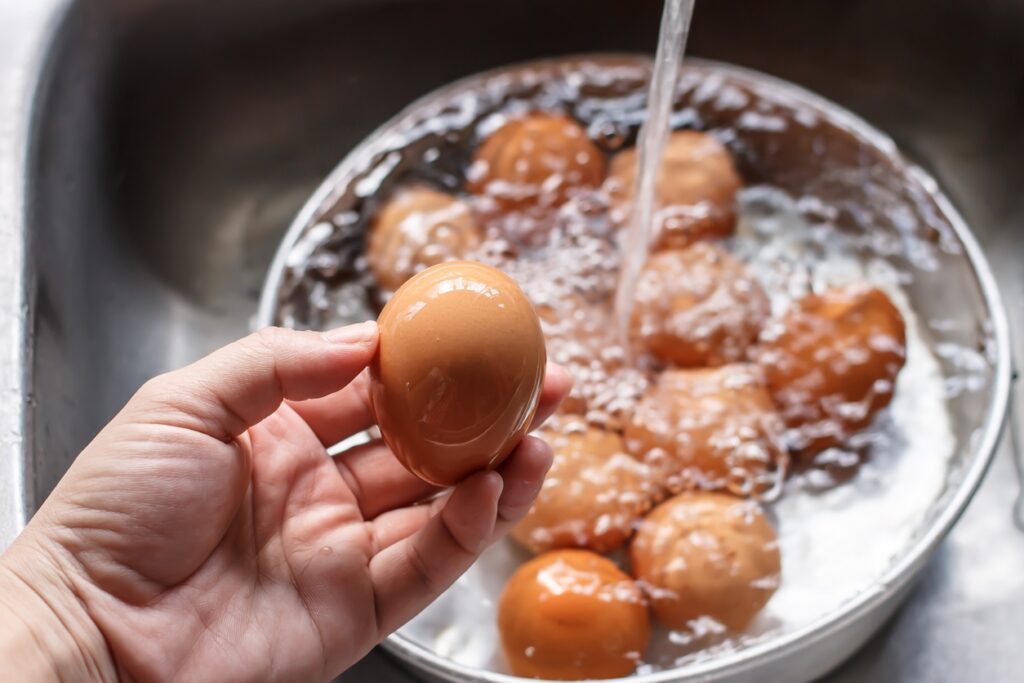
It might seem normal to wash your food before eating it, but does that rule apply to eggs too? In places like the UK, it’s not recommended to wash your eggs, but in the US, many people do. So, how do you know which is best?
When Should You Wash Eggs?
While many eggs are laid in clean nest boxes, not all of them are going to look squeaky clean at first. Eggs that have feces or dirt on them will likely need to be washed for safety reasons.
You can run hot water on the egg to clean it off, but it’s not necessary to use dish soap or other chemicals. Rubbing a piece of sandpaper on the egg is another way to clean the surface.
Why Do Some People Not Wash Eggs?
However, many people don’t wash eggs because it’s not necessary. Eggs naturally have a protective coating on them to keep bacteria out. Some chickens are also vaccinated against salmonella to prevent bacteria spread. However, most chicken flocks in the US are not vaccinated.
Some people avoid washing eggs because it could remove some of the protective coating. So, if you clean your eggs, it’s recommended that you use them right after.
While clean eggs don’t need washing, it won’t harm the egg. If you’re unsure if your eggs are clean, whether they’re from the store or straight from the farm, you should wash them. If they look really gross, it might be safer to toss them.
Frequently Asked Questions
If you’re raising chickens for eggs or just curious about the freshness of your eggs, here are a few more questions you might be wondering.
What Happens if You Eat an Old Egg?
Eating an old egg puts you at risk of Salmonella, which could lead to symptoms like vomiting, diarrhea, and fever. So, if you ever suspect that you might have a bad egg, it’s safest to just throw it out.
What Should You Do if You Accidentally Eat an Expired Egg?
Luckily, rotten eggs pose little risk to humans. If you eat one, there’s a good chance nothing bad will happen, but keep an eye out for unusual symptoms. If you start to feel sick after, you may want to consult a medical professional to see if there are any medications or antibiotics that can help.
How Long Do Egg Whites Last?
If you prefer to eat an egg white over the whole egg, you might store them separately. An egg white can last for up to four days in the fridge. However, you can freeze them in an airtight container for up to six months.
Is the Egg Float Test the Best Method?
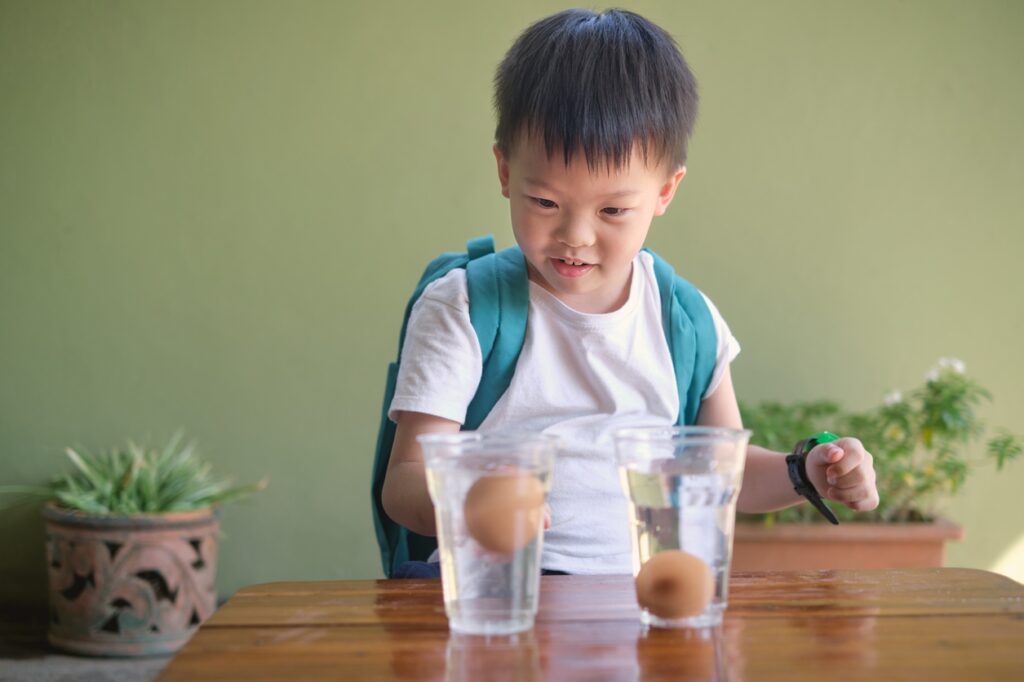
The floating egg test is a classic method for testing an egg’s freshness. Despite being around for so long, it still works well to this day. For people unsure if an egg is safe to eat, putting it in water can give them the answer they’ve been looking for.
If you raise eggs on your own, you probably already know how fresh they are. Yet, it’s a great way to determine the freshness of store-bought eggs. If the eggs float in water, they’re bad, so it’s a great way to avoid getting sick.
The more times you conduct a fresh egg test, the better you’ll get at determining the age of eggs. After all, there are several ways to determine egg freshness, and all ways can be useful for this purpose.
